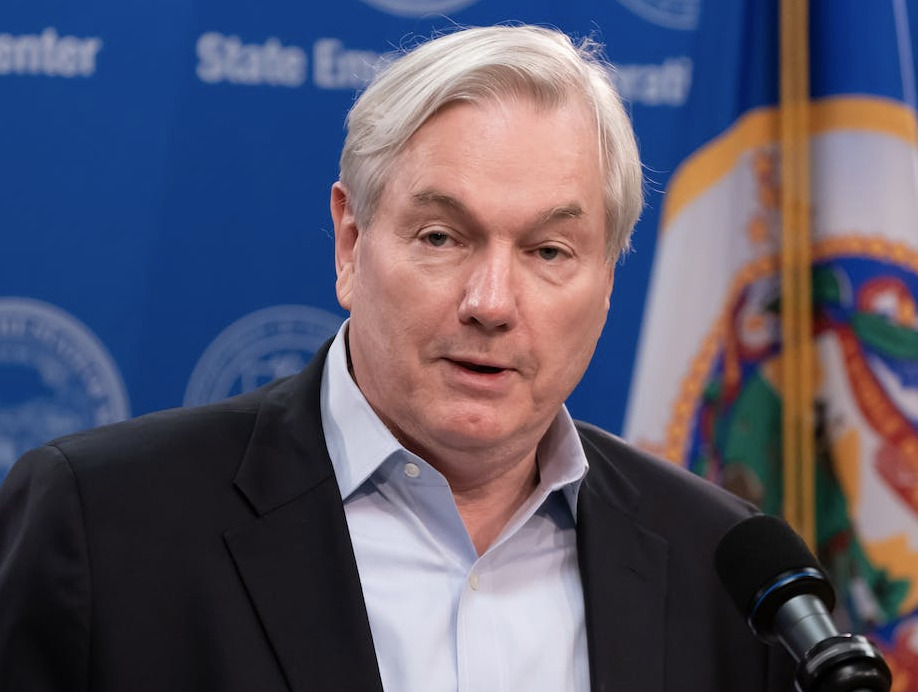
Mike Pence on Leadership and the Future of the Republican Party
Former US Vice President Mike Pence looks back on the events of January 6 2021, his final days in office with President Trump and his…
Thought Leader: Mike Pence

MINNEAPOLIS — For more than three years, Dr. Michael Osterholm, Director of the Center for Infectious Disease Research and Policy at the University of Minnesota, warned that most of us would face a COVID-19 infection at some point.
But that didn’t stop him from taking every step he could to avoid it.
For Osterholm, that day finally came in March, and now his prolonged struggle with the virus, which he refers to as lingering COVID (not to be mistaken for long-haul COVID) has prompted reflection on his own approach, and that of the public health community in general.
He shares his personal experience at a time when we’re seeing a slight rise in COVID-19 hospitalizations nationwide, prompting some public health officials to urge caution as fall approaches and concerns about flu and RSV cases return.
“It’s clear that we’re on the back side of the big pandemic surges, those major increases in cases,” Osterholm said. “We’re not going back to that place, I don’t think, but this is where we have to be just very honest and say, the virus is in control here. We’re not driving this thing. The virus is.”
Dr. Michael Osterholm could point to any number of data points or graphs showing how our current increase in U.S. COVID-19 hospitalizations is still tiny compared to other years, but he knows more than ever that COVID doesn’t care about previous data or opinions.
“I’ve had a number of colleagues and friends who have died from COVID, some of them who were friends who refused to be vaccinated, and ultimately died,” he said. “Those cases really grip you, but there’s nothing like understanding this disease and laying in bed that first night or two. As I just started my Paxlovid I was asking myself, what’s this going to be like?”
Looking back on that bout with COVID, which began back in March, Dr. Osterholm says he feels fortunate that he stayed out of the hospital, but he says his symptoms did linger for months.
“I noticed, originally, just more fatigue,” he said. “Going from just one room to another felt just really tiring, and then that just continued to progress, and at the same time I started noticing memory loss.
“I couldn’t remember obvious things, and at first I was almost in denial (about it being connected to COVID). I thought, ‘Oh my God, I hope I’m not getting early Alzheimer’s here, this is crazy.’ Of course, I should have realized, yeah, look, you’re just on the back end of COVID. I knew enough to know people were experiencing these memory losses.v
“I celebrate the fact that I came out the other end of the tunnel the way I did, and I attribute that to my vaccines.”
But while he fully supports the vaccines and boosters he has received, and all they have done to help others avoid serious illness, hospitalization and death, he says he’s also struggled with the heavy hand of public health officials, especially when it comes to mandating the COVID vaccine.
“I do believe in mandates when they are urgent and necessary now to save lives and have supported those throughout my entire public health career,” Dr. Osterholm said. “I also support a vaccine mandate when vaccines are highly, highly effective and last a long time, like childhood immunizations for our schools. But for a lot of the other vaccines — and people can raise this issue with COVID — it’s a fair question. Your COVID vaccine will protect you for some time, it will surely keep you at a much lower risk of getting seriously ill, but it’s not going to stop you from getting infected, and it won’t stop you from necessarily transmitting the virus.
What we’re finding is, much of the pushback against vaccines across the board today, are spilling out of this anti-mandate mindset, not safety. It’s the idea that if you’re going to tell me to do this, forget it, I’m not going to do it.
Let me be very clear, I can’t wait to get my next booster dose, I’ll be at the front door of whatever clinic opens up first with it, but at this point I recognize, for much of the public, that’s not what they’re feeling.
I look at it as, you’ve got bring people along with trust if you’re going to have public health successful in what it’s trying to do, and I think we have a lot to learn about that.”
Mike Pence on Leadership and the Future of the Republican Party
Former US Vice President Mike Pence looks back on the events of January 6 2021, his final days in office with President Trump and his…
Thought Leader: Mike Pence
Marc Short on U.S. Investment in Critical Minerals
Why do critical minerals matter now? Marc Short explains how U.S. investment in critical minerals fits into a broader strategy around economic security, manufacturing, and…
Thought Leader: Marc Short
Marc Short on AI Policy and the Government’s Role in Chip Technology Investment
On CNBC, Marc Short breaks down the role of AI policy and how government investment is shaping the future of chip technology. A former Chief…
Thought Leader: Marc Short

